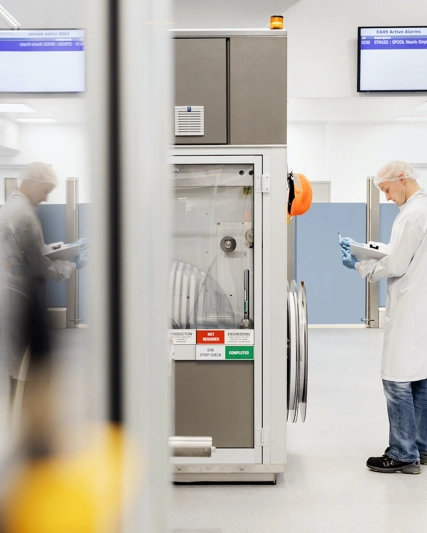Issued: London, UK
For media and investors only
GSK to showcase new research from its broad respiratory portfolio at the European Respiratory Society (ERS) Congress 2025
- 60+ abstracts highlight GSK's ambition in respiratory diseases to reduce exacerbations, prevent hospitalisations, and limit disease progression
- Data from the SWIFT phase III trials will further explore sub-groups of patients with asthma that could benefit from depemokimab
- Additional analyses from the phase III trials of mepolizumab in COPD, including MATINEE, evaluate use in a wide population of COPD patients with varying severity of disease
GSK plc (LSE/NYSE: GSK) will present the latest research from across its respiratory portfolio at the upcoming ERS Congress 2025, from 27 September to 1 October in Amsterdam, the Netherlands. GSK presentations at ERS meaningfully advance the science surrounding respiratory diseases including asthma, chronic rhinosinusitis with nasal polyps (CRSwNP), chronic obstructive pulmonary disease (COPD), as well as refractory chronic cough (RCC) and infectious respiratory diseases. The new research supports the company’s strategy of addressing the underlying drivers of disease to help reduce exacerbations, slow the decline of lung function by limiting disease progression, and decrease the burden on healthcare resources including hospitalisation.
Key presentations will be shared from GSK’s portfolio of biologics to address type 2 inflammation, including depemokimab, an investigational, ultra-long-acting monoclonal antibody, and mepolizumab, a monoclonal antibody indicated to treat several diseases with underlying type 2 inflammation:
- Sub-analyses from the SWIFT-1 and SWIFT-2 trials in asthma with type 2 inflammation, characterised by blood eosinophil count, will further explore different groups of patients with asthma who could benefit from depemokimab. Asthma patient sub-groups include those with comorbid CRSwNP, an important population as up to 40% of severe asthma patients also have CRSwNP (OA2334), and patients requiring medium- or high-dose inhaled corticosteroids (ICS) at baseline (PA2469).1,2
- Additional data from SWIFT-1 and SWIFT-2 will explore the potential for depemokimab to achieve clinical remission in asthma patients with type 2 inflammation, with the aim to advance treatment goals beyond symptom control (PA2478).
- Presentation of data from the ANCHOR-1 and ANCHOR-2 trials in CRSwNP will explore the potential impact of depemokimab on early and sustained improvements in patient reported outcomes (OA2335).
- Additional analyses from mepolizumab phase III development programme in COPD including an indirect treatment comparison from MATINEE which will contextualise the results compared to another approved COPD biologic. The analysis focuses on the risk of exacerbation and the change in Saint George's Respiratory Questionnaire (SGRQ) in patient groups examined in other COPD biologic trials (PA488). Additionally, pooled phase III results from MATINEE, METREX and METREO will examine the use of mepolizumab in a wide spectrum of patients with COPD, including those with varying airflow obstruction levels and irrespective of severe exacerbation history (PA4585).
Additional key presentations will be shared from GSK’s portfolio of inhaled therapeutics, including fluticasone furoate/umeclidinium/vilanterol (FF/UMEC/VI) and salbutamol metered-dose inhaler (MDI) with a low global warming potential propellant. Several of these presentations reflect ongoing research into the earlier use of maintenance therapies, efforts to support symptom control and reduce the risk of exacerbations, while others explore sustainable approaches to asthma and COPD management.
Expanding our commitment to the prevention of infectious respiratory diseases, GSK will present new data on respiratory syncytial virus (RSV) vaccination in younger adults at risk of illness and infection due to certain underlying conditions. In addition, a post-hoc analysis of the pivotal AReSVi-006 trial will be presented, evaluating efficacy in adults with asthma and COPD, including impact on exacerbations and the use of corticosteroids and antibiotics.
Full list of GSK presentations at ERS 2025 include:
| Abstract Name | Presenter | Presentation Details |
|---|---|---|
| Respiratory Biologics | ||
| depemokimab | ||
| Twice-yearly depemokimab demonstrates efficacy in patients with asthma and comorbid chronic rhinosinusitis with nasal polyps (CRSwNP): Phase III SWIFT-1/2 studies | Enrico Heffler | Oral Presentation #OA2334 Session 201 |
| Depemokimab is associated with early and sustained improvements in patient-reported outcomes in CRSwNP: Data from the ANCHOR-1/2 trials | Marjolein Cornet | Oral Presentation #OA2335 Session 201 |
| Twice-yearly depemokimab demonstrates efficacy in patients with asthma across baseline medium- and high‑dose ICS subgroups: Phase III SWIFT-1/2 studies | Ian D. Pavord | Poster Presentation #PA2469 Session 218, Board #1 |
| Clinical remission in patients with asthma treated with twice‑yearly depemokimab in the Phase III SWIFT-1/2 studies | Michael E. Wechsler | Poster Presentation #PA2478 Session 218, Board #10 |
| Higher adherence to biologic therapies in asthma is associated with improved clinical outcomes: Retrospective analysis of claims data | Njira L. Lugogo | Poster Presentation #PA2501 Session 219, Board #13 |
| Twice-yearly depemokimab is well-tolerated in randomised, double-blind, placebo-controlled Phase III SWIFT and ANCHOR studies | Marjolein Cornet | Poster Presentation #PA2477 Session 218, Board #9 |
| Twice-yearly depemokimab reduces exacerbations versus placebo in patients with asthma across age of onset/duration subgroups: Phase III SWIFT‑1/2 studies | David J. Jackson | Poster Presentation #PA2488 Session 218, Board #20 |
| Global differences in the epidemiology and exacerbations among patients with moderate-to-severe asthma | Anna Vichiendilokkul | Poster Presentation #PA367 Session 41, Board #15 |
| Geographic variation in outcomes in RCTs of biologic therapies in patients with asthma or COPD: A systematic literature review | David J. Jackson | Poster Presentation #PA2478 Session 218, Board #2 |
| Depemokimab reduces exacerbations in severe asthma versus other biologics: A multilevel network meta-regression | Arnaud Bourdin | Poster Presentation #PA4610 Session 396, Board #3 |
| Twice-yearly depemokimab demonstrates sustained pharmacokinetics and pharmacodynamics across Phase I and III trials | Stein Schalkwijk | Poster Presentation #PA2479 Session 218, Board #11 |
| mepolizumab | ||
| Mepolizumab sustained FEV1 improvements up to 104 weeks in patients with COPD and less severe airflow obstruction: Post hoc analysis of the MATINEE Phase III study | Dave Singh | Oral Presentation #OA6519 Session 547 |
| Indirect treatment comparison (ITC) of mepolizumab and dupilumab in treating COPD | Jean Bourbeau | Poster Presentation #PA488 Session 47, Board #16 |
| Efficacy of mepolizumab in patients with COPD & type 2 inflammation: Pooled Phase III trial results | Claus F. Vogelmeier | Poster Presentation #PA4585 Session 394, Board #16 |
| Mepolizumab is efficacious in COPD patients with varying levels of airflow obstruction: Pooled Phase III trial results | David M. G. Halpin | Poster Presentation #PA486 Session 47, Board #14 |
| Mepolizumab reduces the burden of exacerbations in COPD irrespective of severe exacerbation history: Pooled Phase III trial results | Joel Schamroth | Poster Presentation #PA487 Session 47, Board #15 |
| Raised blood eosinophil counts are associated with high airway type 2 inflammation in chronic obstructive pulmonary disease | Ron Chen | Poster Presentation #PA1505 Session 130, Board #15 |
| REIMAGINE: A prospective real-world evaluation of clinical remission in patients with severe asthma treated with mepolizumab in a timely manner | David Ramos-Barbón | Poster Presentation #PA4626 Session 396, Board #19 |
| Impact of primary diagnosis of SA or CRSwNP on comorbid patients - Baseline features in the RESPONSE study | Florence Schleich | Poster Presentation #PA1401 Session 125, Board #11 |
| Health-related quality of life (HRQoL) in patients with severe asthma treated with mepolizumab in Arab Gulf countries | Bassam Mahboub | Poster Presentation #PA317 Session 39, Board #5 |
| Mepolizumab in severe asthma: Turkish real-world data from a bi-directional, self-controlled study | Sevim Bavbek | Poster Presentation #PA320 Session 39, Board #8 |
| Effectiveness of mepolizumab in patients with severe asthma with high immunoglobulin E (IgE) or chronic rhinosinusitis with nasal polyps (CRSwNP): A post-hoc analysis of NEST | Mona Al-Ahmad | Poster Presentation #PA5820 Session 488, Board #18 |
| Evaluation of omalizumab to mepolizumab switch in children and adolescents with severe eosinophilic asthma* | Latika Gupta | Poster Presentation #PA5893 Session 492, Board #10 |
| Mepolizumab treatment in children and adolescents with severe eosinophilic asthma (CASAM)-A real-world study: 12 months analysis* | Latika Gupta | Poster Presentation #PA5901 Session 492, Board #17 |
| belimumab | ||
| Incorporating patient perspectives in the design of BEconneCTD-ILD: A belimumab Phase 3 trial in CTD-ILD | Toby M. Maher | Poster Presentation #PA3010 Session 245, Board #7 |
| Inhaled Therapeutics | ||
| umeclidinium/vilanterol | ||
| Disease stability in COPD with umeclidinium/vilanterol (UMEC/VI) compared to tiotropium (TIO), umeclidinium and salmeterol (SAL): Post hoc analyses of ZEP and EMAX studies | Lowie Vanfleteren | Poster Presentation #PA5718 Session 483, Board #16 |
| salbutamol MDI | ||
| Developing low carbon salbutamol MDI: Assessment of relative bioavailability of salbutamol with propellant HFA‑152a | Christer Janson | Oral Presentation #OA3298 Session 269 |
| Developing low carbon salbutamol MDI: Assessment of pharmacodynamic bioequivalence of salbutamol with propellant HFA-152a via methacholine challenge | Dave Singh | Poster Presentation #PA339 Session 40, Board #7 |
| Developing low carbon MDIs to support future patient availability: Effects of HFA‑152a on lung mucociliary clearance | Laura Clow | Poster Presentation #PA340 Session 40, Board #8 |
| fluticasone furoate/vilanterol | ||
| Real-world evidence (RWE): Asthma clinical-outcomes, fluticasone furoate/vilanterol (FF/VI) versus (vs) beclometasone dipropionate/formoterol (BDP/FOR) | Ashley Woodcock | Poster Presentation #PA1415 Session 126, Board #5 |
| Real-world evidence (RWE) study on clinical outcomes in asthma: Fluticasone furoate/vilanterol (FF/VI) versus (vs) budesonide/formoterol (BUD/FOR) | Ashley Woodcock | Poster Presentation #PA2458 Session 217, Board #10 |
| fluticasone furoate/umeclidinium/vilanterol | ||
| On the disposition of airway mucus-plugs in asthma before and after treatment* | Eveline Durom | Oral Presentation #OA2213 Session 179 |
| Chinese patients receiving ICS/LABA or LAMA-containing asthma therapy characterisation: Retrospective cohort study | Zhiliu Tang | Poster Presentation #PA2459 Session 217, Board #11 |
| Asthma remission and small airway improvements after single-inhaler triple therapy* | Sam Tcherner | Poster Presentation #PA3641 Session 308, Board #7 |
| Single-inhaler triple therapy FF/UMEC/VI vs. FF/VI in Chinese adults with uncontrolled asthma adults | Alison Moore | Poster Presentation #PA4632 Session 397, Board #5 |
| Reduction of asthma exacerbations after escalation from BUD/FORM or FP/SAL to FF/UMEC/VI | Stephen G. Noorduyn | Poster Presentation #PA4643 Session 397, Board #16 |
| Asthma healthcare burden with ICS/LABA or LAMA-containing therapies: Chinese retrospective cohort study | Zhiliu Tang | Poster Presentation #PA4644 Session 387, Board #17 |
| Eosinophils, exacerbation history, and BMI as significant predictors of acute COPD exacerbations?* | Rainer Gloeckl | Poster Presentation #PA438 Session 45, Board #6 |
| Insufficient treatment optimisation in COPD patients following clinical worsening in an electronic medical record database in France | Nicolas Roche | Poster Presentation #PA1420 Session 126, Board #10 |
| Cross-cultural and linguistic validation of a tool to help patients with COPD recognise the onset of an exacerbation | Tharishini Mohan | Poster Presentation #PA2019 Session 156, Board #18 |
| Using behavioural modelling to identify COPD patient archetypes for personalised disease management | Tharishini Mohan | Poster Presentation #PA2524 Session 220, Board #16 |
| Effect of inhaler education on critical error reduction in COPD: DECIDE (Discover the Effect of COPD Inhaler Device Education) study* | Hyoung Kyu Yoon | Poster Presentation #PA2568 Session 222, Board #20 |
| From disease improvement to disease stability in patients with COPD: IMPACT post hoc analysis | Dave Singh | Poster Presentation #PA5716 Session 483, Board #14 |
| Refractory Chronic Cough | ||
| camlipixant | ||
| What's in a name? Confusion around refractory chronic cough among US healthcare professionals | Kaiser G. Lim | Poster Presentation #PA3587 Session 305, Board #13 |
| Infectious Diseases | ||
| respiratory syncytial virus vaccine, recombinant adjuvanted | ||
| Immunogenicity and safety of AS01E-adjuvanted respiratory syncytial virus prefusion F protein vaccine (adjuvanted RSVPreF3) up to 6 months post-vaccination in adults 18–49 years of age (YOA) at increased risk of RSV disease and adults ≥60 YOA | Essack Mitha | Oral Presentation #OA5521 Session 466 |
| AS01E-adjuvanted RSV prefusion F protein vaccine (adjuvanted RSVPreF3) reduces RSV acute respiratory illness (ARI)-related complications and medication use in participants with COPD or asthma | Alberto Papi | Poster Presentation #PA3912 Session 321, Board #18 |
| Impact of asthma status on the risk of respiratory syncytial virus acute respiratory infection* | David Watson | Poster Presentation #PA1529 Session 131, Board #19 |
| Epidemiology, burden and clinical course in RSV infection in older adults in the outpatient sector in Germany over three infection seasons* | Christopher Alexander Hinze | Poster Presentation #PA1692 Session 140, Board #5 |
| Clinical course and disease burden of RSV-infected hospitalized adults in Germany* | Christopher Alexander Hinze | Poster Presentation #PA1697 Session 140, Board #10 |
| GSK3923868 | ||
| A systematic literature review of rhinovirus infection in adults with asthma | Isabelle Boucot | Poster Presentation #PA1701 Session 140, Board #14 |
*Supported Collaborative Study
About mepolizumab
Mepolizumab is a monoclonal antibody that targets and binds to IL-5, a key messenger protein (cytokine) in type 2 inflammation. Mepolizumab has been developed for the treatment of a range of diseases with underlying type 2 inflammation. It is currently approved for use in the US and Europe across four IL-5 mediated conditions. Mepolizumab is approved for the treatment of COPD in the US. Regulatory submissions in COPD are under review in several countries, including China and the EU.
For product and important safety information please consult the country relevant summary of product characteristics.
EU available at: https://www.ema.europa.eu/en/documents/product-information/nucala-epar-product-information_en.pdf.
About depemokimab
Depemokimab, a monoclonal antibody that targets IL-5, is the first ultra-long-acting biologic to be evaluated in phase III trials of patients with asthma with type 2 inflammation characterised by blood eosinophil count (SWIFT trials) or chronic rhinosinusitis with nasal polyps (CRSwNP) (the ANCHOR trials). Depemokimab's extended half-life, high-binding affinity and potency, supported six-monthly (26 week) dosing regimens in these trials, and demonstrated early and sustained of type 2 inflammation and IL-5 activity. The phase III programme includes evaluation of depemokimab in other diseases with underlying type 2 inflammation including eosinophilic granulomatosis with polyangiitis (EGPA) and hypereosinophilic syndrome (HES) and COPD. Depemokimab is an investigational product and is not approved for use in any country. Regulatory submissions are under review, including in the US, China, Japan and the EU.
About GSK in respiratory
GSK continues to build on decades of pioneering work to deliver more ambitious treatment goals, develop the next generation standard of care, and redefine the future of respiratory medicine for hundreds of millions of people with respiratory diseases. With an industry-leading respiratory portfolio and pipeline of vaccines, targeted biologics, and inhaled medicines, GSK is focused on improving outcomes and the lives of people living with all types of asthma and COPD along with less understood refractory chronic cough or rarer conditions like systemic sclerosis with interstitial lung disease. GSK is harnessing the latest science and technology with the aim of modifying the underlying disease dysfunction and preventing progression.
About GSK
GSK is a global biopharma company with a purpose to unite science, technology, and talent to get ahead of disease together. Find out more at gsk.com.
Cautionary statement regarding forward-looking statements
GSK cautions investors that any forward-looking statements or projections made by GSK, including those made in this announcement, are subject to risks and uncertainties that may cause actual results to differ materially from those projected. Such factors include, but are not limited to, those described in the “Risk Factors” section in GSK’s Annual Report on Form 20-F for 2024, and GSK’s Q1 Results for 2025.
References
Canonica GW, Malvezzi L, Blasi F, Paggiaro P, Mantero M, Senna G, et al. Chronic rhinosinusitis with nasal polyps impact in severe asthma patients: Evidences from the Severe Asthma Network Italy (SANI) registry. Respir Med 2020; 166:105947.
Heffler E, Blasi F, Paggiaro P, Canonica GW. Costs of Oral Corticosteroid Use in Patients with Severe Asthma With/Without Chronic Rhinosinusitis with Nasal Polyps: Data from the Italian SANI Registry. Adv Ther 2025; 42:1196-206.


